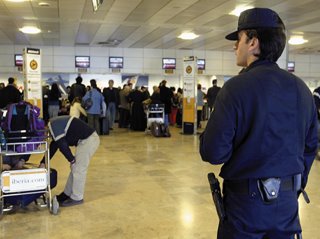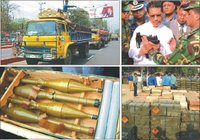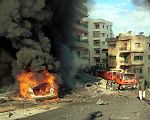
Human history is full of incidents of war. Chronologically there isn’t a single year in which we don’t have cases of armed fights within a country or between countries. Each nation has its share of war and tries to make it – in case of a big victory -a national occasion that is yearly celebrated.
Today we have different types of war that can be carried contrary to
Geneva Conventions . There is War on Terror which needs a particular strategy, not involving just the army but all components of society.
There is the civil war as it is happening in Sri Lanka. There is the allegedly proxy war as it is happening in Lebanon where Hezbollah is fighting on behalf of Iran and Syria. Israel is doing it for the USA, which wants to eradicate all religious radicals in the Middle East.
There is also the war of words. But this war is very cheap. It doesn’t need military equipment or training. All you need is mastery of words to silence your enemy.
The equipments of many armies remain secret, especially if they have banned chemical weapons.
Armies in fight try to win by whatever cost. There are many armies that commit atrocities, especially in civil wars. There have been cases in DR Congo, Sudan and Rwanda. Little was done by the international community to stop it. The only thing it can do is to impose arms embargo. Even this doesn't succeed as there is a black market at least for light weapons.
In armed conflicts, it seems that the civilian population and installations are the main targets. Israel, unable to pinpoint the exact arms location of Hezbollah, makes random attacks. Hezbollah unable to reach Israeli military installations fire rockets. The important is that they reach Israeli land, wherever.
The war, despite the rhetoric remains subject to the law of the jungle. We have incidences in Iraq where some American and British soldiers showed disregard for military ethics. They engaged in rape, torture and killing of civilians.
When war starts, there is little to refrain it. Each army tries to keep its pride. For this it must do what it can not to show its weakness. Action must continue at whatever cost. It’s no wonder if Israel confuses military and civilian targets and if Hezbollah spares no missiles. Both sides seek to leave their landmark in the history of war.
War doesn't have rules because it is war. After the event, there are elaborate justifications, expressions of regret or celebration for the maximum damage inflicted on the enemy.
As long as there is a clash of ideologies and as long as the end justifies the means, there will little regard for internationally recognised rules of law.In each war there are reciprocal accusations of violations of the rules of war.
A war is a fight for survival. When it is raging, soldiers don't open the book of rules. They open fire with all the might they have.



































